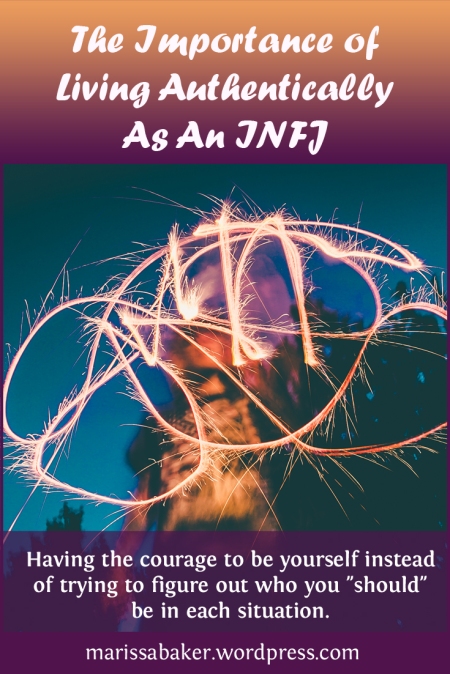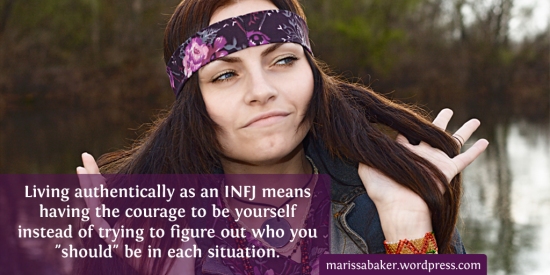As an INFJ, you’re good at picking up on other people’s emotions. And when you pick up on what other people feel you also start to get a good feel for their expectations. For some of us, that seems like a good thing. We know what’s expected of us in different social settings and from different friend groups. We understand who we need to be so we can fit in.
But is that really a good thing for us? Does being able to fit in help an INFJ?
We call it the chameleon effect when an INFJ leverages their unique combination of mental processes to blend in with different groups of people. Chameleon INFJs might even appear as if they’re a different personality type in different situations because they’re automatically shifting toward being extroverted around the extroverts, logical around the thinkers, and interested in the real world around the sensors.
Blending in feels like an advantage at times. That’s why we do it. Fitting in feels safe. It seems like a way to protect ourselves from negative attention. But in reality, using our gifts in this way doesn’t just protect us from bad things. It also blocks us from really being seen and appreciated as ourselves.

The Challenge Of Being Real
Living authentically as an INFJ (or any other type for that matter) means having the courage to be yourself instead of trying to figure out who you “should” be in each situation. But it’s hard for INFJs to move past the pressure of becoming what others expect from them. As FJ types, our decision-making process is focused on maintaining Harmony in all our personal relationships. Any hint of confrontation and we’re worried the relationship is going to crash in around us.
We also worry what might happen if we take off our masks and the person we are underneath is different than what the people we value expect. What if the real “me” scares away the people I care about? What if they want me to go back to wearing my mask?
If that were to happen we know it would hurt. A lot. And we’ve been rejected far too many times not to know that it’s a very real possibility. So we settle for being what’s expected of us because the dull ache of not being seen and understood seems less dangerous than the vicious hurt of being rejected for who we truly are inside.
Do I Know Who I Am?
INFJs want to be known, seen, and accepted for who they truly are. But for many INFJs, even figuring out what “be yourself” means is a challenge. We’ve spent so long living in our favorite masks that we’re not sure who we are underneath. In our minds, we have become the part that we’ve been playing.
When an INFJ chooses to start living authentically, the first challenge is often answering the question, “Who am I?” Because you are a Harmony-loving type, part of that answer is going to include being someone who values the people around you. You’ll still want to meet everyone’s needs when you can, but you need to realize that you’re part of “everyone.” You need to learn to love yourself before you can really, truly love other people.
We can’t keep letting others answer the “Who am I?” question for us. We need to figure out who we are and who we’re meant to be, and then be that person. It’s not easy. Ironically, an INFJ’s own feelings are often far more mysterious to them than those of the people around them. But the personal growth work required to figure out how you can live authentically is one of the most important things we can do for ourselves as INFJs.

Breaking Down Our Walls
Last year, I went from having gone out on 4 dates with 4 different guys over the past 8 years to being in a dating/courtship with an ENFP. Being in that relationship revealed several issues that I thought I’d already dealt with and it dug up some fears that I’d buried so deep I didn’t even know they needed exhumed.
It turns out that rejection is one of my core fears. I started realizing this even before we’d started dating, when he sent me a Facebook message with a follow-up comment to something we’d talked about on the phone. It wasn’t really critical or confrontational, but it hit a nerve and I panicked. I just knew this was the moment when he’d realized he really didn’t want anything more to do with me. That he’d made a mistake wanting to be my friend.
We worked that out and moved on, but a few weeks into our dating relationship something else came up. And I knew with a cold, solid ache in my chest that this was when he’d walk away. That he’d realize there was something wrong with me and I was too much/not enough. But he didn’t. Then it happened again when he ran-in to another one of my walls/secrets that had triggered rejection in the past. And still he didn’t leave.
That’s when I realized that the only thing related to this topic which might make him pull away was if he thought I was trying to hide my real self to become something I thought he wanted. It was the opposite challenge I thought I’d always faced. Instead of needing to hide myself to be accepted, I had to reveal myself. In many ways this seems more difficult, but it’s also far more rewarding.
Why Authenticity Is So Important
It’s not enough to slip through life by blending in. We need to discover ourselves and then live as the glorious, unique people that we really are. Only then we can we love and accept ourselves. And strangely, having an internal sense that we’re worthy of love and belonging is the only way to truly achieve the feeling that we belong and are loved by other people. The games we play to hide ourselves while trying to fit in won’t make us feel less alone. They only numb us so we can’t feel joy any more than we can feel pain. The trade-off isn’t worth it.
I’ve been talking about Brené Brown’s books quite a bit lately on this blog. This idea that our sense of self-worth is tied-in with whether or not we feel love and belonging comes from her research. When we’ve spent so long being what other people wanted it’s scary to step out and learn to value our true selves. But only when we give ourselves permission to do that will we finally be able to embrace and use our unique gifts. And only then will we find the genuine love and belonging we’ve been looking for, but unable to find, by trying to fit in.
 If you’d like to know more about the INFJ personality type, check out my book The INFJ Handbook. I just updated it with a ton of new information and resources. You can purchase it in ebook or paperback by clicking this link.
If you’d like to know more about the INFJ personality type, check out my book The INFJ Handbook. I just updated it with a ton of new information and resources. You can purchase it in ebook or paperback by clicking this link.

I loved this blog post. Very insightful and so true. While blending in may be the easier course of action, in the long run it is best to opt for authenticity, although not always easy. I was reminded of a poem by Paul Laurence Dunbar while reading your post. “We Wear the Mask” It’s one of my favorites and I think relates to the topic of your post. Bravo on a job well done, hun. 👏
LikeLiked by 1 person
Thank you, Kayla. I’d never read that poem before — I’m so glad you mentioned it! It really does relate so well to this post
LikeLike
So resonating! 😱😭😁
LikeLiked by 1 person
Wow! Exactly what I’m going through right now … How to STOP pretending? I recently gave a workshop and I stressed about it so much (I didn’t know the people group I was going to be with, who would challenge me, who would reject me, who would like me) and so I over-prepared. It turned out fine, but I had a migraine for two days. I stressed about the two Old Stoics who were judging me (classic arms crossed and judgmental) and the One Attention Grabber who just would NOT shut up and interrupted every five minutes (even walking BETWEEN me and someone I was talking to TWICE) So. Much. Stress. I’m doing a lot of writing, analyzing WHY I went through this and what reasons I have for putting myself through the process of giving a workshop when I know I am so much more comfortable one on one – relatively small amount of stress. The pull to JOIN IN when asked is SO strong … I want to belong … Thank you!
LikeLiked by 1 person
It’s such a struggle to not join in. Too often I find myself agreeing to something when other people are around, then when I’m alone wondering 1) why on earth it seemed like a good idea and 2) how can I get out of this without upsetting those people I was trying to please in the first place. So frustrating!
LikeLiked by 1 person
exactly!
LikeLike
Loved how insightful this post was! I find it extremely relatable!! 🙂
LikeLiked by 1 person